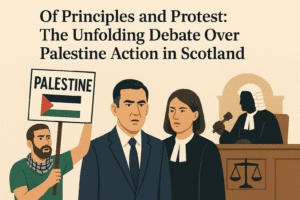Of Principles and Protest: The Unfolding Debate Over Palestine Action in Scotland
Former First Minister Humza Yousaf has called for Scotland’s prosecution service to exempt non-violent supporters of the proscribed group Palestine Action, arguing it is not in the public interest to criminalize peaceful protest. His request, grounded in his experience as a former justice secretary, cites a precedent for such discretion. However, Scotland’s top legal officials firmly rejected the appeal, stating that issuing a blanket policy would compromise the fundamental principle of prosecutorial independence from political influence.
This clash highlights a core tension in democratic societies: balancing the unwavering rule of law with the right to dissent. The situation is further complicated as the UK-wide terror designation creates a potential for legal disparity across borders. At its heart, the debate revolves around whether the state’s power to proscribe an organization should also extend to chilling non-violent expressions of solidarity, leaving citizens navigating a fraught line between lawful protest and perceived criminal support.

Of Principles and Protest: The Unfolding Debate Over Palestine Action in Scotland
Beyond the headlines of political clashes and legal technicalities, a profound debate is unfolding in Scotland about the boundaries of protest, the independence of the judiciary, and the complex interplay between law and conscience.
A Clash of Principles, Not Just Politics
The recent call by former First Minister Humza Yousaf for a prosecution exemption for non-violent supporters of the proscribed group Palestine Action is more than a political maneuver. It represents a fundamental tension that democracies perpetually grapple with: the balance between upholding the rule of law and protecting the right to dissent.
Yousaf, drawing on his experience as Scotland’s former justice secretary, is invoking a concept of “public interest” that extends beyond strict legal enforcement. His argument hinges on the belief that prosecuting peaceful individuals for expressions of solidarity—like wearing a t-shirt or displaying a poster—creates a “chilling effect” that can stifle legitimate, lawful protest. His precedent is the pragmatic prosecution policy adopted for a Glasgow drug consumption room, which prioritized health outcomes over strict drug laws.
The Judiciary’s Guarded Independence
The response from the Lord Advocate’s office, delivered by Solicitor General Ruth Charteris, was a firm defense of judicial independence. Her rejection was not merely a refusal but a principled stand on the role of the prosecutor in a democracy. To issue a blanket statement of non-prosecution for a specific group, she argued, would compromise the core duty to independently enforce laws enacted by elected politicians.
This stance was pre-emptively echoed by the Crown Office’s chief executive, John Logue, who warned of the danger when “unhelpful politicians” call for laws not to be enforced, risking the perception that prosecutors take their orders from the government. This highlights a critical, often misunderstood, pillar of democracy: the separation of power between the political executive and the judicial arm.
The Human Dimension: Protest in a Time of Conflict
Beneath this high-level legal and political exchange lies a deeply human story. The estimated 700 arrests across the UK, including dozens in Scotland, are not abstract statistics. Each represents an individual acting on deeply held convictions about a devastating international conflict. For many, these actions are a moral imperative, a way to voice anguish over events thousands of miles away. The law, however, now categorizes support for a specific organization as a potential terror offense.
This creates a precarious situation for citizens. Where does lawful solidarity end and illegal support begin? The ambiguity itself can be intimidating, which is precisely the “chilling effect” Yousaf and human rights groups like Amnesty International warn against.
A Scottish Dilemma with UK-Wide Implications
This is not solely a Scottish issue. The proscription of Palestine Action is a UK government decision, and any significant deviation in prosecution policy in Scotland would have immediate ramifications. It would create a stark cross-border legal discrepancy and could be seen as a direct challenge to Westminster’s authority on national security matters. The fact that the ban is already being challenged in the High Court in London adds another layer of complexity, placing everyone in a state of legal limbo.
The Path Forward
The value for readers lies in understanding this situation not as a simple political spat, but as a live case study in democratic governance. It asks us to consider:
- How should a society distinguish between dangerous criminality and passionate, non-violent protest?
- Where does the “public interest” truly lie when a law itself becomes the subject of public controversy?
- How can legal systems maintain both their integrity and their responsiveness to public conscience?
Yousaf’s request for a meeting with the Lord Advocate suggests this conversation is just beginning. The outcome will depend on whether a path can be found that safeguards the principle of independent justice while addressing legitimate concerns about the scope of peaceful protest. It is a difficult needle to thread, but its resolution will tell us much about the health of democratic discourse in both Scotland and the wider UK.
You must be logged in to post a comment.